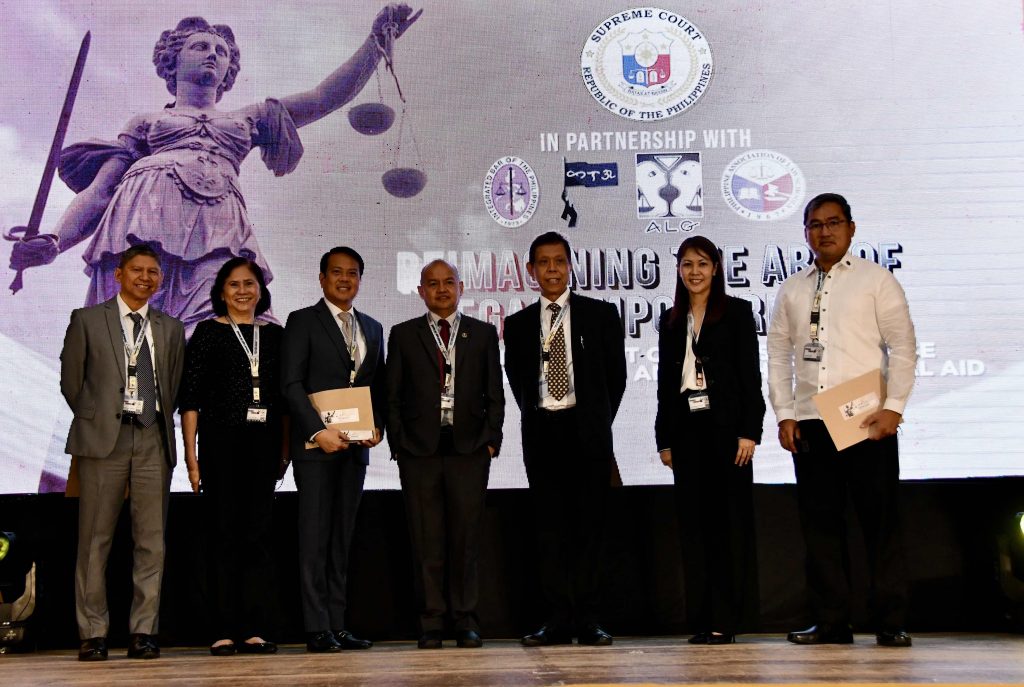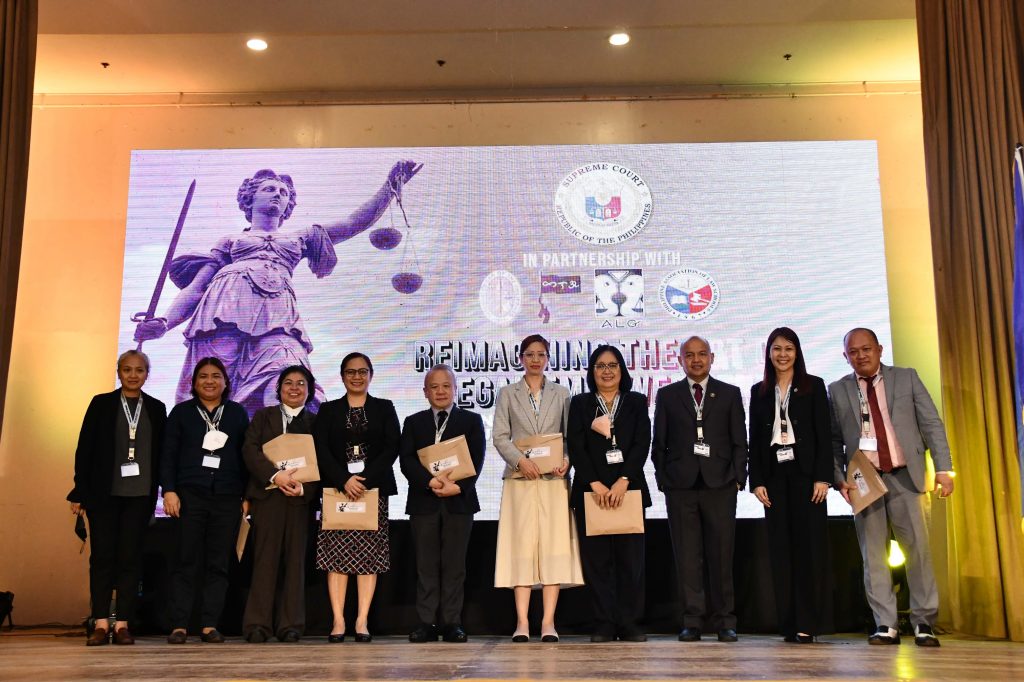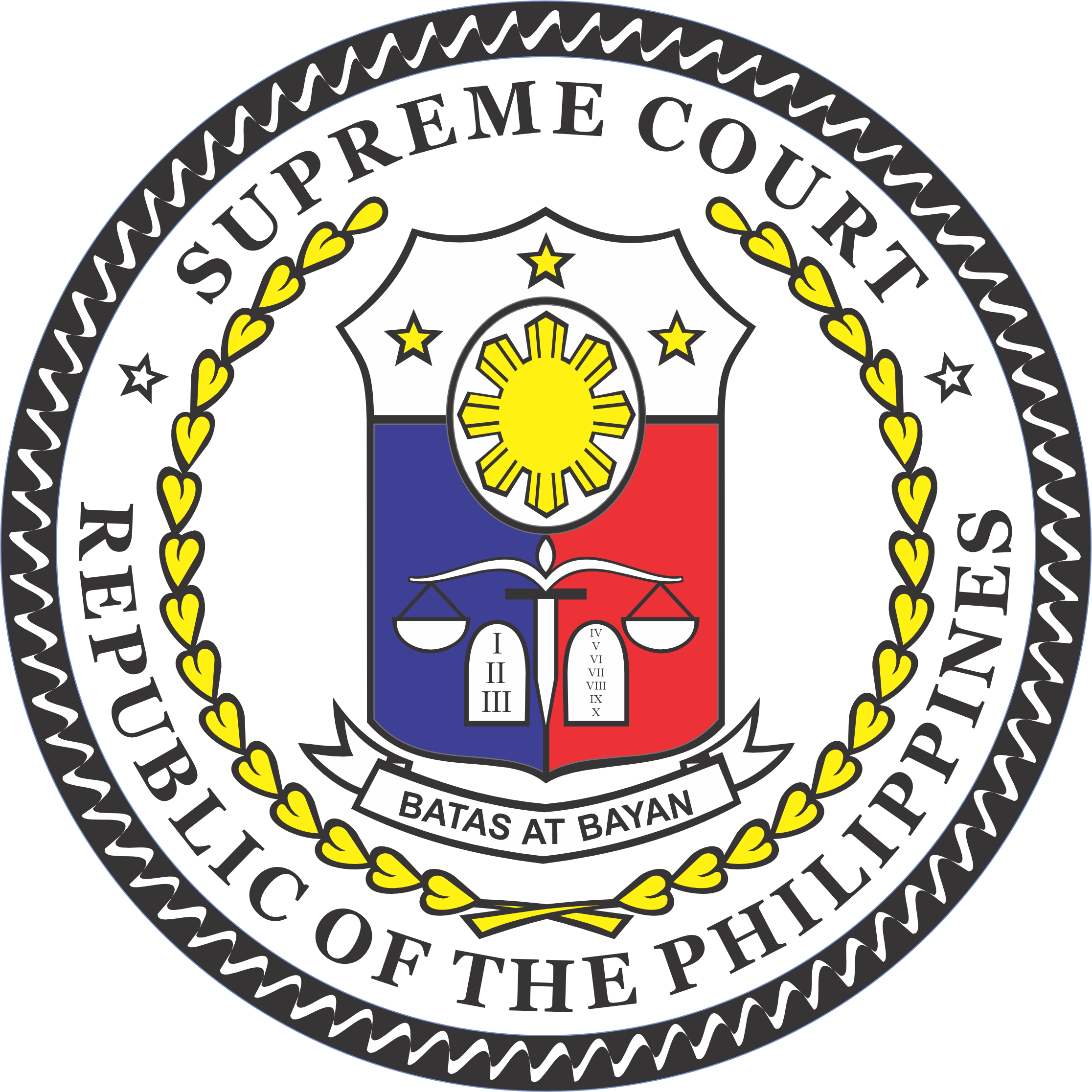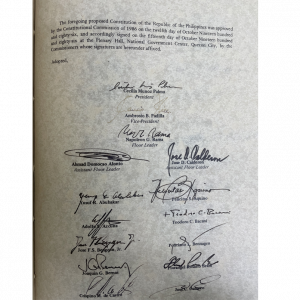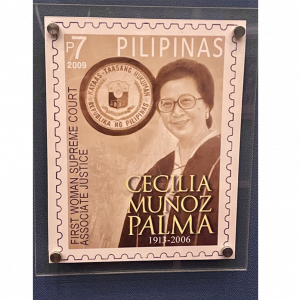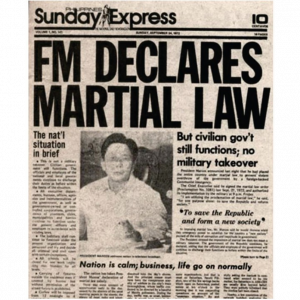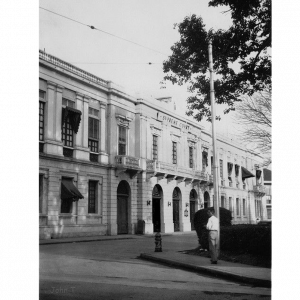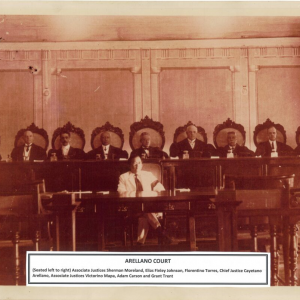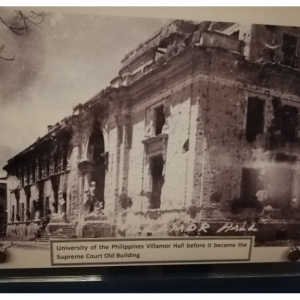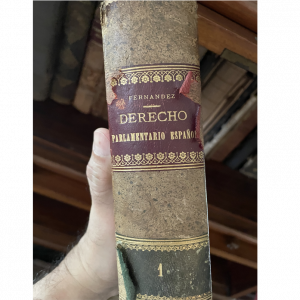SC, IBP Convene 2022 National Legal Aid Summit
November 29, 2022
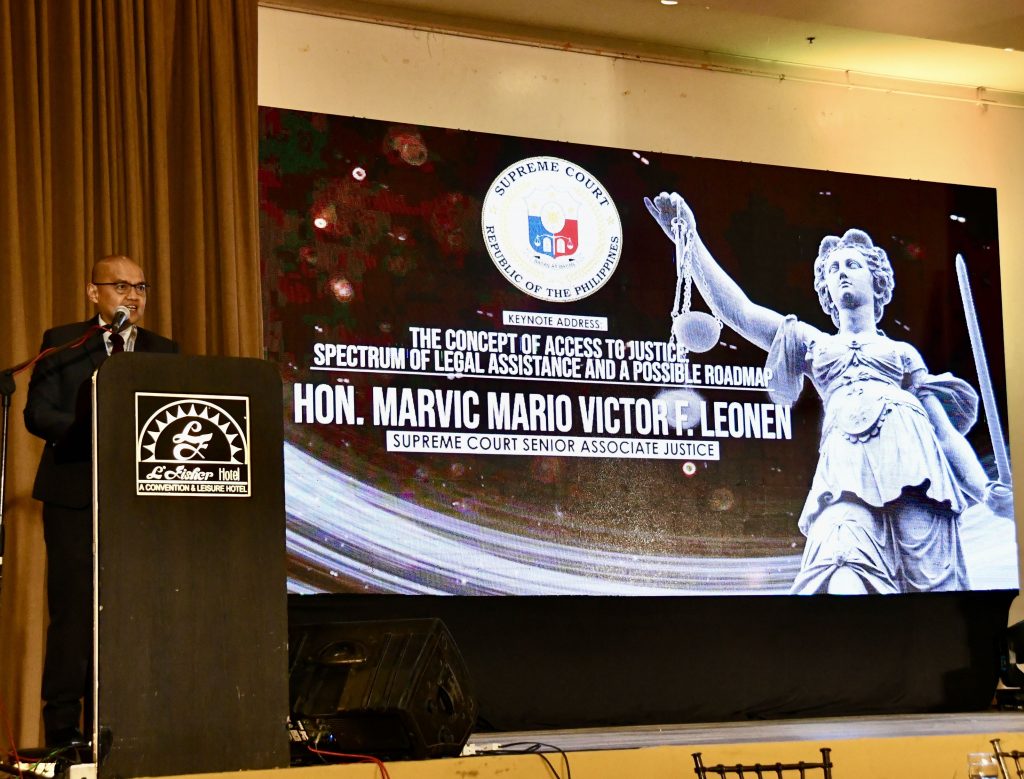
Senior Associate Justice Marvic M.V.F. Leonen, Chairperson of the Supreme Court Committee on Access to Justice/Underserved Areas, delivers his keynote address titled “The Concept of Access to Justice: Spectrum of Legal Assistance and a Possible Roadmap” on the first day of the 2022 National Legal Aid Summit in Bacolod City.
In line with its constitutional mandate to ensure that legal assistance is provided to the underprivileged at all times, the Supreme Court of the Philippines has convened the 2022 National Legal Aid Summit from November 27 to 30, 2022 at L’Fisher Hotel in Bacolod City, Negros Occidental.
The Summit, titled “Reimagining the Art of Legal Empowerment: National Summit on Access to Justice through Cultivating Approaches on Legal Aid,” aims to develop a roadmap that will amplify, provide, and sustain avenues of access towards the constitutional guarantee of adequate legal assistance through various plenary discussions, dialogues, keynote addresses, and breakout sessions. The Summit is in partnership with the Integrated Bar of the Philippines (IBP), the Philippine Association of Law Schools (PALS), the Free Legal Assistance Group (FLAG), and Alternative Law Groups (ALG).
In his message to the participants, Chief Justice Alexander G. Gesmundo emphasized the importance of legal aid in the nobility of the legal profession, saying that the legal profession is a noble one as it is used to secure peace and order in society through the preservation of the rule of law. “It carries with it a public dimension. As it is involved in the administration of justice, it exists for the society and the public in general,” said the Chief Justice.
“Indeed, the legal profession is a public service. It is a service to others in need of justice. It is a service to others in search of truth,” underscored Chief Justice Gesmundo. “Lawyering does not give us entitlement. Lawyering thrives on truth, not on lies. Lawyering does not exploit a person’s ignorance. On the contrary, it looks after the disadvantaged and the marginalized, in order to give them a voice, to give them the chance to be equal with others, if not in life, at least in law.”
The Chief Justice also stressed that the legal profession is reserved not only for the brightest and most capable, but more importantly, for the most morally fit and socially committed individuals which is why the Court has shifted its attention to the lawyer’s ethical and social responsibilities in order to highlight what is essential in the practice of this profession.
He shared that the Court has taken steps to re-orient the practice of law through the implementation of reforms in legal education, with the end view that through greater participation in legal aid programs, law students will develop a strong commitment to public service.
“Deciding to be a lawyer entails the ultimate moral choice to uphold truth, excellence, good faith, and fairness in one’s work,” said the Chief Justice. “To be a lawyer is nothing less of discipleship for Justice. Indeed, the nobility of the legal profession thrives in the staunch moral constitution demanded of every lawyer,” he concludes.
In his keynote address titled “The Concept of Access to Justice: Spectrum of Legal Assistance and a Possible Roadmap,” Senior Associate Justice (SAJ) Marvic Leonen, Chairperson of the SC Committee on Access to Justice/Underserved Areas, urged the participants to consider 10 points in the area of legal aid. These are as follows:
- Legal aid, as traditionally understood, cannot be universally mandatory, as doing so will only superficially address access to justice. “It only looks good on policy paper, said SAJ Leonen, adding that from experience, compulsion mitigates and even undermines passion. “Compulsion to do what is noble in our profession may only have the opposite effect,” he said. SAJ Leonen posited that a more sensible alternative “would be that traditional legal aid be made mandatory only for law firms with more than 20 lawyers and with a threshold income.”
- “Legal aid or access to justice should never be under the umbrella of only one organization. There should be interaction, interorganizational coordination and referrals, but no one group dominating the rest for access to justice,” he submitted.
- “We should, however, have some common For example, addressing corruption. Exposing and prosecuting these cases, and analysis of its various reincarnation should be part of access to justice. This is the time that we protect all whistleblowers,” said SAJ Leonen, adding that without addressing corruption, any policy-reform initiative will be undermined.
- “Clinical legal education must provide more space or accommodate those who would like to do actual critical research and policy advocacy.”
- “Our law schools should reform. Legal education should become heterodoxical. The legal academe should be empowered, and the law curriculum should be seriously reviewed.” SAJ Leonen proposed that law schools move away from being elaborate bar review centers. “Instead, it should also add two important competencies: skills to practice and advocate, as well as critical legal thinking skills that will allow more lawyers to make the law more legible in the context of our own society. Sharia’h and indigenous laws, for example, should be made part of the curriculum, so should alternative dispute settlement systems as part of remedial law.”
- “Continued research on the impact of our laws and procedure on our ability to provide justice should be more scientific and empirical. This requires also an understanding of the requirements of justice, as well as access from a philosophical, historical, sociological, and economic point of view.”
- “There should be a true, scientific, and empirical study on the demographics of our profession: its current preferences, the conditions of those preferences, and the impact of policy reform that are meant to alter those preferences in favor of recovering the nobility of our profession.”
- SAJ Leonen also said that the legal profession “should be encouraged to be sensitive to and evolve more public interest cases in the proper way. This requires the skills to communicate with and empower those who are marginalized and oppressed.”
- “The dockets of our courts, especially the Supreme Court, should become more rational to make space for deeper analysis and rethinking of many of the worn-out doctrines that have contributed to impoverishment, inequality, marginalization, and oppression.”
- “Besides having a full communication plan on access to justice, there should be an annual symposium on our progress towards better and more authentic access to justice in all its dimensions,” added SAJ Leonen..
SAJ Leonen likewise stressed that the collective vision of the Summit participants should be to make the law relevant by taking the time “to reflect critically on what we do, and proceed with conscious, deliberate, and critical effort to practice law, and also for us to decide our cases.”
“Perhaps, then, with the collective efforts of the Members of the Court, we can provide more than just the rule of law, but the rule of justice. Perhaps, then, we do not contribute to the disempowerment of the already weak, marginalized, and the oppressed. We do not maintain inequality. Perhaps, then, we can lead by defining for the profession the possibility that law is no longer for the powerful but rather a tool to truly liberate our people and cause major discomfort for those who stand for greed and are corrupt,” he concluded.
More than 200 representatives from the Supreme Court, the Philippine Judges Association, the Department of Justice, the Department of Migrant Workers, the Commission on Human Rights, the IBP, the Philippine Bar Association, PALS, FLAG, ALG, National Union of People’s Lawyers, Public Attorney’s Office, the Legal Education Board, the University of the Philippines – Office of Legal Aid, Philippine Alliance of Human Rights Advocates, law firms, the American Bar Association Rule of Law Initiative (ABA ROLI), European Union GoJust II Programme (GOJUST), and The Asia Foundation Programme (TAF) are participating in the three-day Summit.
Organized with the support of the ABA ROLI, GOJUST, and TAF, the Summit aims to develop a roadmap that will amplify, provide, and sustain avenues of access towards the constitutional guarantee of adequate legal assistance.
The holding of the Summit is in line with the objective of the Supreme Court to conduct a holistic evaluation of all legal aid programs nationwide under “Outcome Area 3: Access” of its Strategic Plan for Judicial Innovations 2022-2027 (SPJI), the Judiciary’s blueprint of plans and programs for the next five years.
As the strengthening of legal aid initiatives is one of the objectives of the SPJI, the Supreme Court commits itself to review various public interest legal services, alternative legal programs, developmental legal aid, and other legal assistance programs of all law groups. (Courtesy of the Supreme Court Public Information Office)
